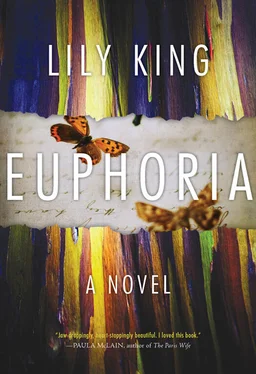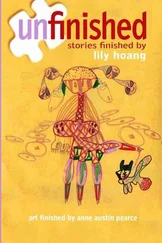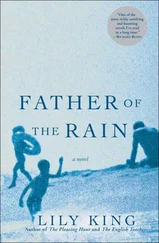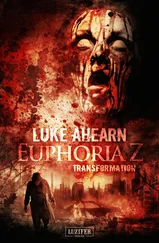‘Luro is going to Parambai today, to help settle the dispute about Mwroni’s bride price.’
‘Who?’
‘Mwroni. Sali’s cousin.’
‘I’m going to help with the canoe, Nell.’
‘We just don’t have any idea about how they negotiate—’
‘It’s not my fault you aren’t pregnant.’
The lie of it hung between them.
‘I keep doing my part,’ he said.
I would be seven months along now, she thought. He knew it too.
Behind the scrim she heard Bani fixing Fen’s breakfast and singing. She couldn’t understand the words. Songs always came last. Often they were strings of names, a line of ancestors, with no breaks between words. Madatulopanararatelambanokanitwogo-mrainountwuatniwran , he sang, high alto and with tenderness. He could be so serious it was hard to remember he was just a boy.
Bani had told her that he was not a Tam by birth. He was a Yesan, stolen by the Tam in a raid in retaliation for the kidnapping of a Tam girl a Yesan man was in love with. He thought he was less than two when it happened. She asked who raised him and he said many people. She asked who was his family here and he said she and Fen.
‘Do you see your mother?’ she asked.
‘Sometimes. If I go with the women to the market. She is very skinny.’
Nell hadn’t understood tinu, skinny, until he sucked in his stomach and pressed his arms to his sides. He had initiation scars from shoulder to wrist and down his back, raised bumps they created by deliberately infecting the cuts.
‘What do you feel when you see her?’ she asked.
‘I feel I am happy I am not skinny and ugly like she.’
‘And she? What does she feel?’
‘She feels our Tam women ask too much for fish. That is what she says every time.’
Fen’s gong signal rang out.
‘Bloody hell,’ he said, scooting off the mat. ‘Why is he so damn slow?’
‘Don’t be hard on him.’
She heard him tell Bani to put his food in a basket. ‘Hurry.’
The noise below swelled as he went down the ladder. She heard their greetings and Fen’s Baya ban many times. Good day, good day. The children would be reaching to touch his arms and put their fingers in his pockets. His gong beat sounded again and she heard him call in a gorgeous accent she would never possess, Fen di lam. Fen is coming.
She got up and put on the shift she’d worn all week, a once white sundress she’d bought on 8th Street for a nickel.
‘Meni ma,’ she called as she rolled up the window shades.
‘Damo di lam,’ several called back. We are coming.
‘Meni ma,’ she said again, for it rarely sufficed to say things just once. The Tam used an operatic repetition when they spoke.
‘Damo di lam.’
The house began to shake as people headed up the ladder.
‘Damo di lam.’
Luquo came in first. ‘Baya ban,’ he muttered and only once as he hurried to reach the crayons and the paper and drop into his corner with them. His uncle would come get him within the hour, and scold him for coming here when he was expected to help mix pigments down on the men’s road. But Luquo was bored by the years of apprenticing that a boy must put in. He liked to come to the white woman’s house. He didn’t squat like the others but got on all fours with the paper beneath him, his muscles taut and his naked body swaying slightly as he pressed the crayons hard into the paper. He liked his colors deep and lush and he ground down a crayon as van Gogh was said to flay a brush. She wished she could show him a van Gogh, the self-portraits, for Luquo always drew a portrait, a fierce man in feathers and bones and paint, not a mask, not a head, but the full body of a man. My brother, he said whenever she asked. Xambun, he hollered.
Others liked to talk. Amini, a girl of seven or eight, tried to come up with as many questions for Nell as Nell had for her. Amini wanted to know why she wore all that cloth, why she used a fork to eat, why she wore shoes. And she wanted to know how Nell made all these things she had. Today, as Nell was handing her her favorite doll, Amini asked something she could not understand. Amini repeated it then pointed to Nell’s fingers. She wanted to know why she had them all. Few adult Tam had all their fingers. Cutting off fingers was a ritual of mourning a close relative.
‘We do not cut our fingers,’ Nell said, using the other pronoun for we — nai — she had learned, which did not include the person being spoken to.
Despite this grammatical flourish, Amini smiled the way they all did when she spoke. ‘Who do you mourn?’ she asked brightly, as if asking Nell her favorite color.
‘My sister,’ she told her. ‘Katie.’
‘Katie,’ Amina said.
‘Katie,’ Nell said.
‘Katie.’
‘Katie,’ said a few others, some squatting, chewing, drawing, weaving. The old man Sanjo had found one of Fen’s cigarettes and chewed on it slowly. Katie, the room murmured. It was like breathing life into something long inert. No one had ever said her name in their house afterward.
There were no women visitors today. There were not often many, as they fished in the morning, but today there were none. And the men who’d come were agitated, scowling, full of complaints.
Old Sanjo pointed to her typewriter in the big mosquito room. His skin stretched across his armpits like a bat’s, so thin it was nearly transparent.
She had promised him she would show him how it worked.
‘Obe,’ she said to him. Yes.
Nearly everyone got up.
‘Only Sanjo,’ she said.
She took him into the room. He poked at the netting, firm in its wooden frame. He drew back to poke harder.
No, she told him.
He looked all around, tracing the lines of this ten-by-ten frame of netting they were in. He looked like he wanted to leave. Everyone else was peering in, noses against the screen.
She ripped a piece of paper from her notebook and spun it around the platen.
Sanjo , she typed quickly. He stepped back at the noise. Several children screamed. She pulled out the paper and handed it to him. ‘You. Sanjo. In English. In my talk.’
He touched the letters she’d typed. ‘I have seen this before,’ he said. He pointed to her books. ‘I did not know it could be my name.’
‘It can be anything.’
‘They are powerful?’
‘Sometimes.’
‘I do not want them.’
She realized he saw the letters as part of his ‘dirt,’ a piece of him like hair or skin or shit that enemies could steal and put a hex on.
‘It is not your dirt.’
He handed it back to her.
‘I will keep it here,’ she said. ‘Then it will be safe.’
Fen did not return for lunch, so she was able to get out early on her rounds to the women’s houses. She had been visiting these twelve houses for six weeks now. They each contained several families, minus the men and the initiated boys, who slept in the ceremonial houses closer to the lake. Despite her daily progress with the language, she felt she’d reached an unexpected plateau with the women. The men, though harder to access because she was not allowed into their houses, were free with their words, included her in their talk of who would marry whom, and what would have to be paid, and to whom, while the women had far less patience for chatter. She had never known a tribe where the women were more reticent than the men.
Because the rains were late, the road was a desiccated crust, hard as marble underfoot. Ripe fruit exploded when it hit the ground. Hot air blew down from the high trees, their dry fronds cracking against each other. Bugs aimed for her eyes and mouth, looking for moisture.
At the turn in the road she found Fen with a few men, scraping out the last bits of wood pulp from the hollowed trunk with flat rocks. As usual, even for manual labour, the Tam men wore many strings of round yellow shells around their neck, armbands of bamboo fiber, and fox fur pubic covering. Their hair was curled and festooned with parrot feathers. The shell necklaces clacked rhythmically as they worked. Three skulls, leather-brown with age, were propped up against a tree nearby to oversee and bless the work of the descendants of their clan. One skull was missing its jaw. Nell looked for it and sure enough, it hung around the neck of Toabun, the clan elder.
Читать дальше











